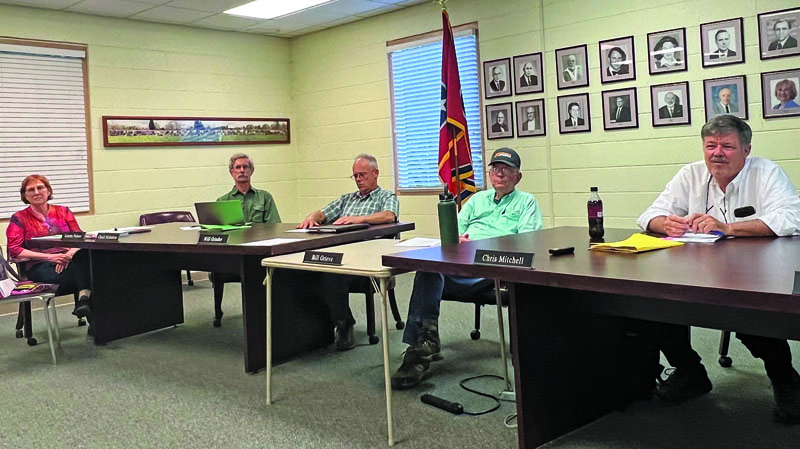Norris Water Commission gets an update on sewer regionalization

Members of the Norris Water Commission, who are also all of the members of the Norris City Council, meet at the Norris Community Building on Monday, June 17. They are, from left: Loretta Painter, Chairman Chuck Nicholson, Will Grinder, Bill Grieve and Mayor Chris Mitchell. (photo:G. Chambers Williams III )
But no recommendations are close to being finalized yet, City Manager Adam Ledford told the Norris Water Commission last week.
Ledford and Mayor Chris Mitchell gave the Norris Water Commission – which consists entirely of the full City Council – a report on a recent meeting they had with the Clinton Utilities Board, Anderson County Water Authority, county Mayor Terry Frank, and engineering consultants on the regionalization move.
Councilman and Water Commission Chairman Chuck Nicholson participated in the meeting via a Zoom video connection.
Last November, Norris was granted a $3.37 million state “water infrastructure” grant to pay for the study on regionalization.
The move could result in the city teaming with the other two utilities to create a wastewater treatment system that would most likely be operated by Norris, but serve city customers and some outside the city limits who are now connected to CUB or ACWA sewer lines.
Although the study is looking at several options, it was conceived by Norris as a way to help control sewage-treatment costs through “economies of scale,” by expanding the city’s customer base beyond the city limits.
Mitchell told the water commission during last week’s meeting that he isn’t interested in creating a new public entity to take over the sewer system.
“It’s our study,” he said. “I’m against establishing a new governing body.”
Norris is looking at the possibility of having to build a new sewage treatment plant to replace its aging facility just off East Norris Road, which would cost millions of dollars.
As for the current study, using the Knoxville engineering firm Cannon & Cannon, Norris is paying a match of $177,500, for a total project cost of about $3.55 million.
“The proposed project will study the benefit of diverting a portion of ACWA sewer flows from CUB to Norris, allowing Norris to increase revenue to offset capital costs associated with [its Wastewater Treatment Plant] improvements,” according to a letter from the Anderson County Water Authority to the Tennessee Department of Environment & Conservation’s Division of Water Resources in the application for the grant, which was sent to the state last August.
“The study will also look at growth potential to appropriately size the Norris [Wastewater Treatment Plant] improvements for the future as part of long-term regionalization efforts,” the letter said.
Norris is currently under a TDEC director’s order to make millions of dollars in upgrades and improvements to its wastewater treatment system, which also could eventually require construction of a new treatment plant.
But because Norris now has only about 600 sewer customers, it is looking for ways to expand the wastewater system’s customer base to help keep sewer rates down.
The ACWA sewer lines in the Andersonville area now route their flow of collected wastewater to a CUB treatment plant miles away
With this proposed change, however, the sewage would be treated at the much-closer Norris plant.
“Re-routing ACWA’s flows to the Norris plant will also remove a portion of wastewater flows that enter the ACWA system and ultimately the CUB plant, which will in turn help provide additional capacity in the interim of a CUB long-term plant expansion,” the ACWA letter said.
“ACWA stands to also benefit by reducing the distance it is required to pump its wastewater, providing energy savings and extending equipment lifespans.”
The application summary submitted to the state notes that:
“This [application] proposes a ‘Wastewater Regionalization Master Plan’ in eastern Anderson County, with the goal of … treatment plant expansion to provide mutual benefit to three utility systems in the area [Norris, ACWA and CUB].”
All required matching funds for the grant would be provided by Norris, the application notes.
Mitchell discussed the proposal with the City Council during its August meeting, and he praised Water and Sewer Superintendent Tony Wilkerson for taking a lead role in planning the application.
“This will be a great benefit for the citizens in our community,” the mayor said of the grant, which was approved on Nov. 2.

